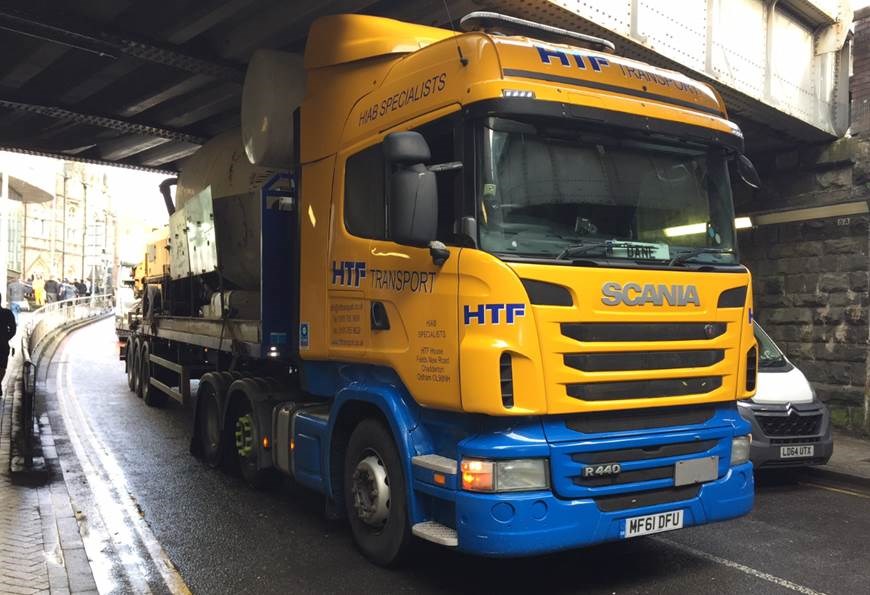Tuesday 31 Oct 2017
Oversized lorries hit rail bridges every week in Wales and the borders causing misery for travellers
- Region & Route:
- Wales & Western: Wales & Borders
- | Wales & Western
Thousands of rail passengers in Wales and the borders will suffer hours of delays and cancellations in the next month as 'bridge-strikes' - when a lorry that's too big hits a low bridge - reach their peak.
Almost 2,000 bridge strikes happen across the UK every year, costing the taxpayer some £23m in damages and delays, and new figures reveal strikes are most common in October and November.
When a rail bridge is struck by a high sided vehicle it must be examined by a qualified engineer to see if it has been damaged. Depending on the bridge, trains may have to travel at a reduced speed or could be stopped completely until the examination has taken place, to ensure the safety of passengers.
In Wales and the borders, there have been more than 900 bridge strikes since 2009, costing the taxpayer thousands of pounds and causing hours of delays to rail passengers. Innovative technology is now being used on Bute Street rail bridge in Cardiff, one of the busiest railway bridges in Wales.
A remote bridge camera system has been installed on the bridge, which carries the Valley lines in and out of Cardiff and has already experienced three strikes this year. The new system will allow engineers to remotely monitor the structure when a strike occurs. This reduces the time it takes to confirm if any significant damage has been caused to the structure and it means trains can get moving again quickly once it has been established the structure is safe.
Network Rail has also been working with haulage companies to urge drivers to measure vehicles and plan their route to avoid bashing bridges as part the 'What the truck' campaign, which involves:
- Engaging the haulage and public transport industries
- Fitting steel beams on rail bridges where there are a large number of strikes to reduce the impact, resulting in less damage to infrastructure
- Working with local authorities to ensure road signs displaying bridge heights are correct and up to date
- Calling for stricter enforcement of penalties for drivers when strikes do happen.
Billy Kelly, chief operating officer for Network Rail in Wales and the Borders, said: “We would like to remind drivers to check the height of their vehicles before passing under any bridges.
“Every time a large vehicle strikes a rail bridge, it can cause inconvenience for thousands of passengers in Wales and the borders, as well as potential costs for taxpayers.
"We work closely with our partners Arriva Trains Wales to get passengers on the move as quickly and safely as possible when an incident does occur, but we need HGV drivers and their employers to get on board with our initiative and make bridge strikes a thing of the past.”
Lynne Milligan, customer services director at Arriva Trains Wales, said: "Safety is paramount on Britain’s railways so I am delighted that our partners in Network Rail are introducing this new technology that will reduce the amount of disruption to customers whilst keeping us safe.”
Notes to Editors
Notes to editor:
- On average, a bridge is struck every three days in Wales.
- Drivers of lorries and buses who are chancing it under railway bridges, rather than checking if their vehicle will fit, cost the taxpayer and businesses a whopping £23 million a year.
- Over 40 per cent (43%) of lorry drivers admit to not measuring their vehicle before heading out on the road and over half (52%) admit to not taking low bridges into account when planning their routes. As a result, Network Rail is calling on haulage companies and drivers of high vehicles to check their height and plan their routes, to help reduce these numbers and keep the travelling public safe.
- On average, each incident causes over 2 hours of delays to train services, and impacts on road traffic, leaving travellers out of pocket and out of time.
- To find out more about bridge strikes and how you can report a bridge strike please visit: https://www.networkrail.co.uk/running-the-railway/looking-after-the-railway/bridges-tunnels-viaducts/risk-bridge-strikes/
Contact information
Passengers / community members
Network Rail national helpline
03457 11 41 41
Latest travel advice
Please visit National Rail Enquiries
Journalists
Network Rail press office - Bryony Parry
Media Relations Manager
07734 649220
Bryony.Parry@networkrail.co.uk
About Network Rail
We own, operate and develop Britain's railway infrastructure; that's 20,000 miles of track, 30,000 bridges, tunnels and viaducts and the thousands of signals, level crossings and stations. We run 20 of the UK's largest stations while all the others, over 2,500, are run by the country's train operating companies.
Usually, there are almost five million journeys made in the UK and over 600 freight trains run on the network. People depend on Britain's railway for their daily commute, to visit friends and loved ones and to get them home safe every day. Our role is to deliver a safe and reliable railway, so we carefully manage and deliver thousands of projects every year that form part of the multi-billion pound Railway Upgrade Plan, to grow and expand the nation's railway network to respond to the tremendous growth and demand the railway has experienced - a doubling of passenger journeys over the past 20 years.
Follow us on Twitter: @networkrail
Visit our online newsroom: www.networkrailmediacentre.co.uk

